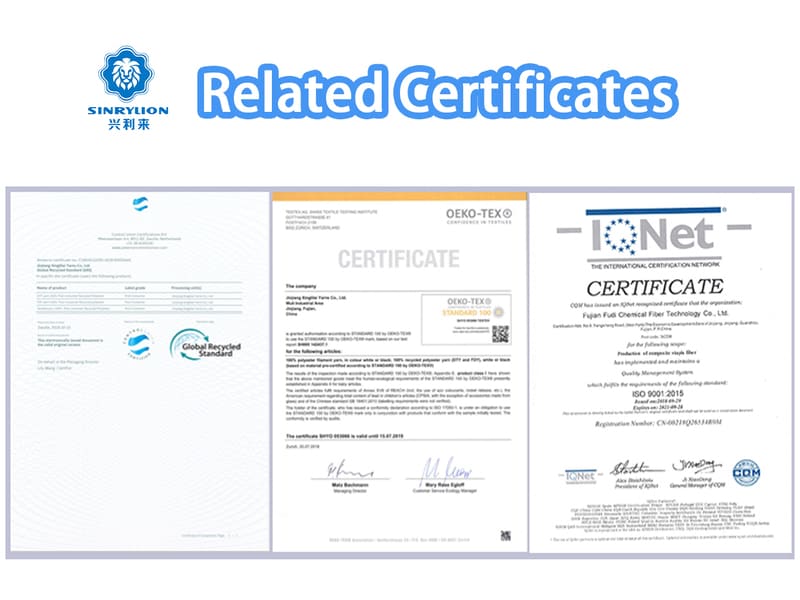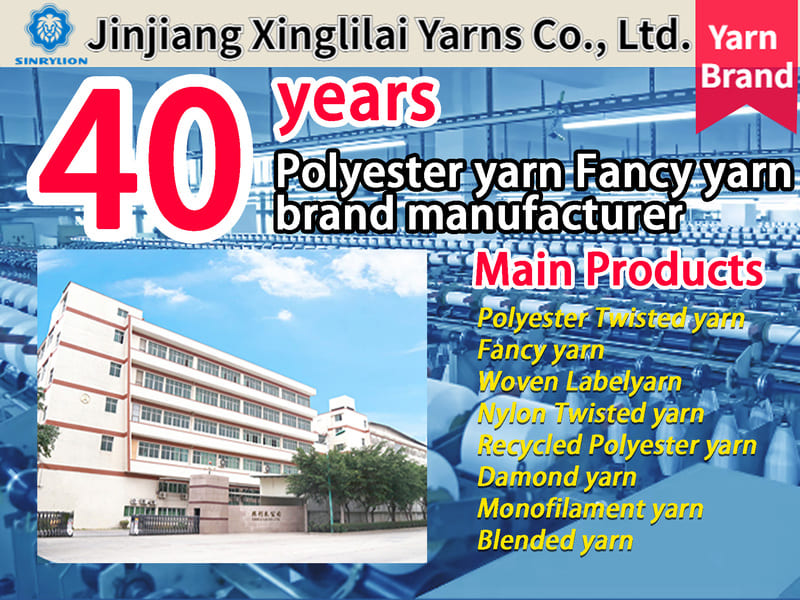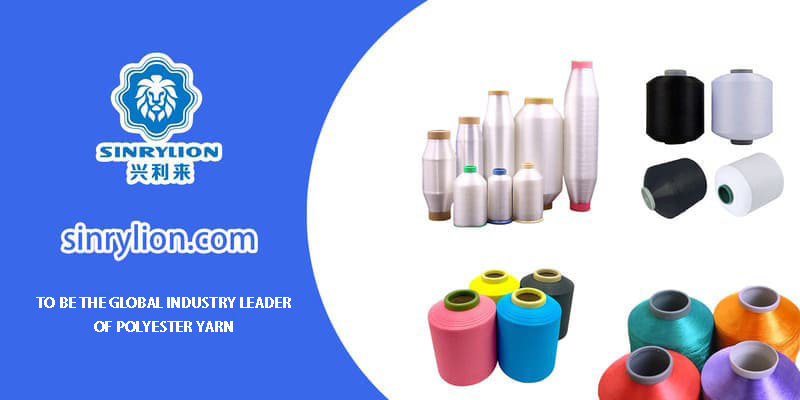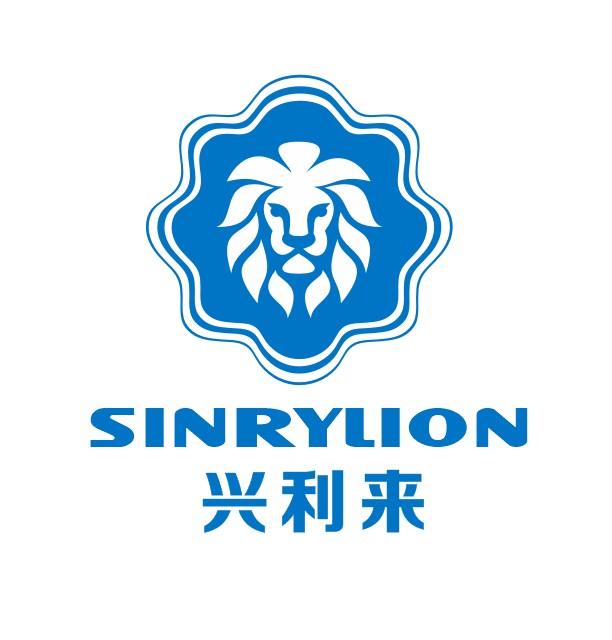Five Key Things to Consider When Buying Recycled Polyester Yarn
Understand the Quality Standards of Recycled Polyester Yarn
- ● Source of Recycled Polyester Yarn: Recycled polyester yarn mainly comes from recycled PET bottles, discarded fibers, and production waste. Through mechanical or chemical recycling processes, these discarded materials are transformed into high-performance fibers suitable for textiles and knitted products. Understanding the source of fibers helps assess yarn purity and spinnability, which directly affects the quality and performance of the final product.
- ● Major International Certifications and Standards: Reliable recycled polyester yarn usually comes with authoritative certifications, such as GRS (Global Recycled Standard), which ensures traceable fiber sources and includes social and environmental audits, OEKO-TEX Standard 100, which guarantees that the yarn is free from harmful substances, and ISO 9001 quality management system certification, which ensures stable and reliable production processes.
- ● Reference Testing Indicators: Buyers can evaluate yarn quality using test reports or third-party lab data. Key indicators include tensile strength (to prevent breakage during weaving or knitting), elongation at break (affects fabric softness and durability), colorfastness (ensures stable dye performance), and spinnability (fiber length and twist compatibility affecting production efficiency). Understanding these metrics helps buyers make informed decisions and avoid relying solely on supplier claims.

Choose the Right Specifications Based on Application
- ● Yarn Specification Selection: The specifications of recycled polyester yarn directly influence fabric performance. For example, higher denier yarns are suitable for heavy fabrics or industrial textiles, while lower denier yarns are ideal for lightweight garments or knitted fabrics. Higher twist yarns are tight and wear-resistant, whereas lower twist yarns feel soft and are suitable for close-to-skin garments. Regarding color, dope-dyed yarns offer high colorfastness and environmental benefits, while post-dyeing is more flexible but requires uniform dyeing.
- ● Application Matching: Different applications demand different yarn properties. Sportswear and outdoor clothing require lightweight, elastic, and wear-resistant yarns; knitted fabrics emphasize softness and stretch, footwear and industrial fabrics demand high strength, tensile resistance, and abrasion resistance, home textiles need a balance of comfort, durability, and environmental friendliness.
- ● Supplier Communication Tips: Clearly communicate your purpose, specifications, colors, and functional requirements to your polyester yarn supplier. Providing samples or technical drawings helps avoid mismatched specifications and material waste.
Are you looking for affordable recycled polyester yarn? You have come to the right place. We are committed to providing our customers with quality products and the best value. Your satisfaction is our motivation. Send an email to janekwok@xll-group.com today and our manufacturer will be happy to serve you.
|
Contact Us |
Email: janekwok@xll-group.com |
Whatsapp: +86-15980572980 |
Verify Supplier Reliability and Production Capacity
- ● Assess Supplier Professionalism: Choosing a supplier involves more than price; production capacity and management quality are crucial. Long-established companies have mature production processes and quality control. Factory size, equipment quantity, and automation directly impact production stability. Self-built R&D and testing centers ensure product innovation and quality control.
- ● Capacity and Delivery Capability: Before purchasing, confirm the supplier’s production capacity and lead time to ensure stable supply and support for small-batch or bulk orders, avoiding disruption to production schedules.
- ● Case Reference (Sinrylion): Sinrylion, a professional polyester yarn supplier, has 40 years of yarn production experience, over 400 machines (about 200 doubling machines), a self-built R&D and testing center, and holds ISO9001 and OEKO-TEX certifications. These advantages allow Sinrylion to provide multi-specification and multifunctional recycled polyester yarn, ensuring product quality and supply reliability.

Consider Sustainability and Environmental Impact
- ● Environmental Benefits: Using recycled polyester yarn significantly reduces environmental impact, including energy savings, reduced waste, and lower carbon emissions. This is a major reason why recycled polyester yarn is popular in the market. Adopting recycled yarn not only helps companies fulfill environmental responsibilities but also enhances brand image among environmentally conscious consumers.
- ● Certifications and Traceability: Ensure that the yarn has traceable environmental certifications such as GRS (Global Recycled Standard), which verifies recycled fiber sources and covers social responsibility audits, and Recycled Claim Standard (RCS), which guarantees transparency of recycled content. Such certifications provide reliable environmental assurance and help demonstrate product sustainability to clients.
- ● Supplier Environmental Commitment: Select suppliers with transparent supply chains and environmental strategies. These suppliers often disclose production processes, energy-saving measures, and social responsibility actions, ensuring sustainable procurement and enhancing the company’s green reputation in the industry.
Cost, Lead Time, and Flexibility
- ● Cost Factors: Purchasing costs involve not only raw material prices but also recycling processing, production, and shipping expenses. Understanding cost components helps assess whether a quote is reasonable and avoid quality risks from low prices. By analyzing quotes and services from multiple suppliers, buyers can choose the most cost-effective partner.
- ● Lead Time: From sample approval to bulk delivery, there is usually a certain lead time. Confirming the supplier’s delivery schedule in advance helps plan production efficiently, avoiding delays in product launches or client deliveries. A stable lead time is a key indicator of supplier reliability.
- ● Flexibility and Customization: Reliable suppliers should support small-batch orders, suitable for product trials or market testing. Suppliers with customization capabilities can produce yarns with varying specifications, functions, or colors according to client needs, responding quickly to changes and improving supply chain adaptability. Supplier flexibility directly impacts a company’s responsiveness and innovation capacity in a competitive market.

Send Inquiry
X
We use cookies to offer you a better browsing experience, analyze site traffic and personalize content. By using this site, you agree to our use of cookies.
Privacy Policy
 English
English 한국어
한국어 বাংলা ভাষার
বাংলা ভাষার हिन्दी
हिन्दी Türkçe
Türkçe русский
русский




